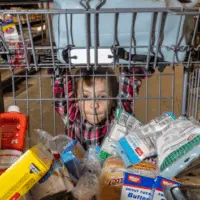
(WASHINGTON) — Just as SNAP benefits were reinstated for millions of Americans following the reopening of the federal government, many are now set to permanently lose them.
Nearly 42 million Americans, including low-income families and vulnerable households, rely on SNAP, or the Supplemental Nutrition Assistance Program, to help pay for groceries or other household essentials.
The U.S. Department of Agriculture has been directing states to implement new guidance as part of President Donald Trump’s megabill signed into law in July, which will include new work requirements, decreased eligibility for refugees and states shouldering some of the cost of the program.
Estimates from the Congressional Budget Office (CBO) published in August suggest that, as a result of the changes, more than 3 million Americans could lose assistance within the next few years.
“I think millions of people are going to lose food. … There’s no question this is going to create more harm and suffering and hunger,” Joel Berg, CEO of the nonprofit hunger relief organization Hunger Free America, told ABC News.
New work requirements
Under the megabill, the upper age limit for those who need to meet work requirements was raised from age 54 to 64 for the first time for able-bodied adults without dependents
Additionally, exemptions were changed for parents or other family members with responsibility for a dependent under 18 years old to under 14 years old.
According to CBO estimates, about 1.1 million people will lose SNAP benefits between 2025 and 2034, including 800,000 able-bodied adults through age 64 who don’t live with dependents and 300,000 parents or caregivers up to age 64 with children aged 14 and older.
Exemptions were also removed for homeless individuals, veterans and young adults who were in foster care when they turned age 18. Meanwhile, exemptions were added for American Indians.
CBO estimates the removal of these exemptions will lead to a loss of benefits for 300,000 people among those groups.
Berg said these requirements will be harmful because people may have to leave work to visit a government office providing proof of work and potentially losing wages.
“It’s really work reporting requirements, and we know none of these requirements actually increase work,” Berg said. “It’s adding them for veterans, as if they haven’t given enough to the country. It’s adding work requirements for parents of teenagers. It’s adding work reporting requirements for homeless people. How homeless people are going to be able to get and keep jobs is really beyond me.”
Berg added that it’s important to dispel the myth that all Americans who are on SNAP don’t have jobs or participate in work programs.
Data from the 2023 American Community Survey shows the majority of American families receiving SNAP benefits had at least one family member working in the past 12 months.
However, work requirements can reduce program participation. A 2021 report from the National Bureau of Economic Research found SNAP work requirements could lead to up to 53% of eligible adults exiting the program within 18 months.
Asylum seeker restrictions
Under the megabill, refugees, asylum seekers and those granted legal protection for humanitarian reasons are no longer eligible for SNAP benefits, removing decades of federal precedent.
This includes trafficking victims who were previously certified by the Department of Health and Human Services and Iraqi or Afghan special immigrant visa holders who worked with U.S. forces or agencies.
Under CBO estimates, about 90,000 people in these categories will become ineligible for SNAP benefits.
The only non-citizens who can still receive benefits include lawful permanent residents, although they must wait five years after receiving their green card, with certain exceptions.
Additionally, Cuban or Haitian entrants under humanitarian parole, as well as people in the U.S. under the Compact of Free Association — a series of international agreements between the U.S. and three Pacific Island nations — are also eligible.
“This policy is both mean-spirited and counterproductive,” Naomi Steinberg, HIAS Vice President of U.S. Policy and Advocacy, said in a statement. “Resettled refugees and asylees have been granted legal protection to permanently live and work in the United States. Denying families who are just getting their feet on the ground in their new American communities is unspeakably misguided, especially when denying basic nutritional assistance undermines their ability to achieve self-sufficiency and stability as quickly as possible.”
States sharing costs
States will have to share in the cost of SNAP benefits under the megabill, a change from the federal government shouldering the cost of the program.
Under the megabill, states with SNAP payment error rates above 6% have to pay a share of 5% — starting in 2028 — up to a maximum of 15 % of SNAP benefit costs.
CBO estimates some states will keep their current benefits and eligibility, while others will modify and some will leave the program altogether. This will reduce or eliminate SNAP benefits for about 300,000 people between 2028 and 2034.
A Commonwealth Fund analysis found that about $128 billion in federal costs will shift to the states, and many will not have the funds to meet the required matches. This could force states to opt out of SNAP for their residents.
“They’re increasing administrative costs on states, which many states are going to use to reduce access,” Berg said. “That’s going to cause states to either raise taxes, cut something else, or cut food.”
Copyright © 2025, ABC Audio. All rights reserved.














